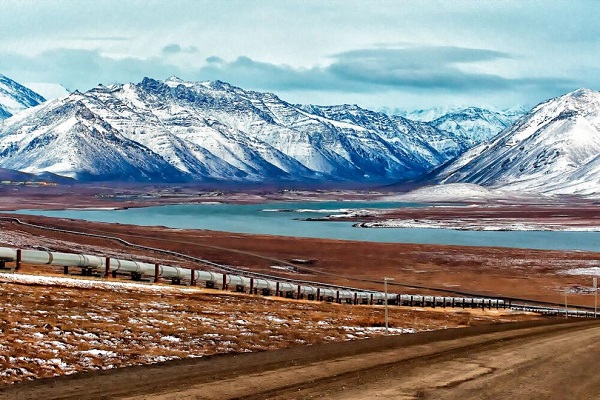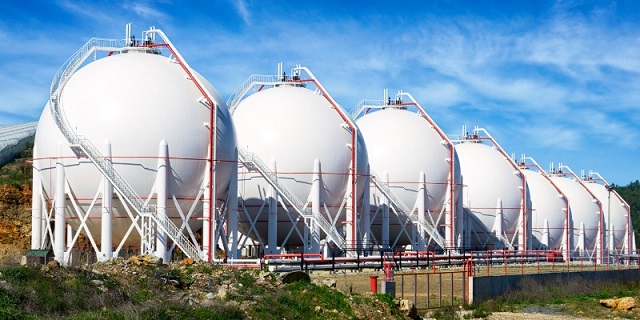Energy
Houses passes bill to protect domestic oil production, protect Iñupiat community

From T
Indigenous communities are advocating for economic development projects in the North Slope, explaining that more than 95% of their tax base comes from resource development infrastructure.
The U.S. House passed another a bill to advance domestic energy production, this time in response to cries for help from an indigenous community living in the Alaska North Slope.
The bill’s cosponsor, a Democrat from Alaska, did not vote for her own bill. It passed with the support of five Democrats, including two from Texas who are strong supporters of the U.S. oil and natural gas industry.
The U.S. House has advanced several bills and resolutions to support domestic U.S. oil and natural gas production, supported by Texas Democrats. They’ve done so after the Biden administration has taken more than 200 actions against the industry, The Center Square reported.
One includes the Department of the Interior restricting development on over 50% of the Arctic National Wildlife Refuge (ANWR), directly impacting the Iñupiat North Slope community.
The Alaska North Slope region includes a part of ANWR and National Petroleum Reserve-Alaska (NPRA). Both are home to the indigenous Iñupiat community who maintain that the Biden administration is trying to “silence indigenous voices in the Arctic.”
The plan to halt North Slope production was done through a federal agency rule change, a tactic the administration has used to change federal law bypassing Congress. The rule cancels seven oil and gas leases issued by the Trump administration in the name of “climate change.” Interior Secretary Deb Haaland said canceling the leases was “based on the best available science and in recognition of the Indigenous Knowledge of the original stewards of this area, to safeguard our public lands for future generations.”
The indigenous community strongly disagrees, saying they weren’t consulted before, during or after the rule change.
Nagruk Harcharek, president of the Voice of Arctic Iñupiat, a nonprofit that represents a collective elected Iñupiaq leadership, says the administration’s mandate “to ‘protect’ 13 million acres of our ancestral homelands was made without fulfilling legal consultative obligations to our regional tribal governments, without engaging our communities about the decision’s impact, and with an incomplete economic analysis that undercuts North Slope communities.”
He argues the administration has overlooked “the legitimate concerns of elected Indigenous leaders from Alaska’s North Slope. This is a continuation of the onslaught of being blindsided by the federal government about unilateral decisions affecting our homelands.”
Restricting NPR-A oil production is “yet another blow to our right to self-determination in our ancestral homelands, which we have stewarded for over 10,000 years. Not a single organization or elected leader on the North Slope, which fully encompasses the NPR-A, supports this proposed rule,” he said, adding that they asked for it to be rescinded.
In response, U.S. Reps. Mary Sattler Peltola, D-Alaska, and Pete Stauber, R-Minn., introduced HR 6285, “Alaska’s Right to Produce Act.” The U.S. House Committee on Natural Resources Subcommittee on Energy and Natural Resources held a hearing on the issue; members of the Iñupiat Community of the Arctic Slope and the Kaktovik Iñupiat Corporation testified.
Kaktovik Iñupiat Corporation president Charles Lampe said they “refuse to become conservation refugees on our own homelands and unapologetically stand behind the Alaska’s Right to Produce Act.”
The Kaktovik is the only community located in the ANWR. The North Slope Iñupiat have stewarded their ancestral homelands for thousands of years, predating the creation of the U.S. federal government, the Interior Department and the state of Alaska, they argue.
The indigenous communities are advocating for economic development projects in the North Slope, explaining that more than 95% of their tax base comes from resource development infrastructure. Tax revenue funds public school education, health clinics, water and sewage systems, wildlife management and research and other services that otherwise would not exist, they argue. Eliminating their tax base, will directly impact their lives and jeopardize their long-term economic security, they argue.
The House passed Alaska’s Right to Produce Act on Wednesday to reverse the rule change and establish the Coastal Plain oil and gas leasing program. It authorizes and directs federal agencies to administer oil and natural gas leasing on 13 million acres of public land in the North Slope.
The bill passed by a vote of 214-199 without the support of its Democratic cosponsor from Alaska, Peltola, who voted “present.”
Five Democrats voted for it: Sanford D. Bishop, Jr. of Georgia, Henry Cuellar and Vincente Gonzalez of Texas, Jared Golden of Maine and Marie Gluesenkamp Perez of Washington. One Republican voted against it, Rep. Brian Fitzpatrick of Pennsylvania.
After it passed, Harcharek said, “Since the Biden administration announced this decision in September, our voices, which overwhelmingly reject the federal government’s decisions, have been consistently drowned out and ignored. This administration has not followed its well-documented promises to work with Indigenous people when crafting policies affecting their lands and people. We are grateful to Congress for exercising its legislative authority to correct the federal government’s hypocrisy and advance Iñupiaq self-determination in our ancestral homelands.”
Kaktovik Mayor Nathan Gordon, Jr. said the administration “is regulating our homelands in a region they do not understand and without listening to the people who live here.” The new law is “a vital corrective measure that will prevent our community from being isolated and protect our Iñupiaq culture in the long term.”
The bill heads to the Democratic controlled Senate, where it is unlikely to pass.
Energy
Tech giants’ self-made AI energy crisis

For years tech giants have been helping climate catastrophists shut down reliable fossil fuel electricity. Now the grid they’ve helped gut cannot possibly supply their growing AI needs.
|
|
For years tech giants have been helping climate catastrophists shut down reliable fossil fuel electricity, falsely claiming they can be replaced by solar/wind.
Now the grid they’ve helped gut can’t supply their growing AI needs.¹
- For the last decade, tech giants such as Apple, Microsoft, Meta, and Google have, through dedicated anti-fossil-fuel propaganda and political efforts, promoted the shutdown of reliable fossil fuel power plants in favor of unreliable solar and wind.
- Tech giants have propagandized against reliable fossil fuel power plants by falsely claiming to be “100% renewable” and implying everyone could do it. In fact, they have just paid utilities to credit them for others’ solar and wind use and blame others for their coal and gas use.²
- In addition to their “100% renewable” propaganda, tech giants directly endorsed people and policies who shut down reliable fossil fuel power plants.E.g., The RE100 coalition, including Google, Apple, Meta, and Microsoft, advocates for policies to “accelerate change towards zero carbon grids at scale by 2040.”³
- Companies’ propaganda that solar/wind could rapidly replace fossil fuels has proven false.
Statewide blackouts in California (2020) and Texas (2021) were caused by the failure of solar/wind—which can go near zero at any time—to make up for lack of reliable fossil fuel capacity.
- Thanks in significant part to tech giants’ advocacy, we have now shut down enough reliable power plants to be in a nationwide electricity crisis.
For example, most of North America is at elevated/high risk of electricity shortfalls between 2024-2028.⁴
- The anti-fossil-fuel, pro-unreliable solar and wind political climate that tech giants have fostered is getting much worse, as the Administration has pledged to further reduce reliable electricity supply via power plant shutdowns and add artificial demand through EV mandates.
Biden’s EV mandate: a dictatorial attack on the American driver and the US grid
·APR 22Biden’s de facto mandate of over 50% EVs by 2032 is a dictatorial attack on the American driver and the US grid that will 1. Force Americans to drive inferior cars. 2. Place massive new demand for reliable electricity on a grid that is declining in reliable electricity supply.
Read full story - While for years tech giants didn’t seem to have any concern about the electricity supply disaster their propaganda and policies were bringing about, they are now very interested because of the accelerating power requirements of computing, above all the hyper-competitive AI space.
- To function at its potential, AI requires massive amounts of power. E.g., state-of-the-art data centers can require as much electricity as a large nuclear reactor.⁵
- Electricity demand from US data centers already doubled between 2014 and 2023. Now with the fast growth of energy-hungry AI, demand from data centers could triple from 2.5% to 7.5% of our electricity use by 2030, according to Boston Consulting Group.⁶
- In large part due to AI, nationwide electricity demand is projected to skyrocket. Official 10-year projections for the US have summer and winter peak demand rising by over 79 gigawatt and over 90 gigawatt. 90 gigawatt is equivalent to adding the entire power generating capacity of California (!)⁷
- Given the woeful underpowered grid that AI giants have helped bring about, dramatically rising demand from AI will not only contribute to massive electricity shortages, but it will also destroy a lot of potential for AI to occur in the United States.
- Limited and expensive electricity will force data centers to operate with higher cost or lower capacity within the US—or take a performance hit in the form of increased latency (which can drastically reduce the value of the product) by moving offshore.
- Not only is offshoring data centers destructive from an economic standpoint, it also poses a substantial security risk. E.g., Building a data center in China—which we already depend on dangerously for critical minerals—gives the CCP physical power over more parts of our economy.
- Economically, data centers are a gold mine of opportunities.Globally, data centers employed 2M people full-time in 2019, many in high-skill/high-pay jobs—and this number is forecast to increase nearly 300K by 2025.
Our gutted grid will cost many Americans these opportunities.⁸
- In the face of woefully inadequate electricity supply for their AI goals, tech giant CEOs are finally speaking up about the lack of power.
E.g., Meta CEO Mark Zuckerberg said in an interview that energy will be the #1 bottleneck to AI progress.
- It is not enough for tech giants to warn us about the lack of reliable power. They need to take responsibility for their anti-fossil-fuel advocacy that helped caused it. And they need to support energy freedom policies that allow all fuels to compete to provide reliable power.
End preferences for unreliable electricity
·DECEMBER 14, 2022Today’s grids are being ruined by systemic preferences for unreliable electricity: 1) no price penalty for being unreliable 2) huge subsidies for unreliables 3) mandates for unreliables Congress should end these now. The Opportunity America, given its combination of abundant domestic energy resources, technological ingenuity, and free-market competition, has …
Read full story - An example of a tech giant influencer not taking any responsibility for causing the electricity crisis is BlackRock CEO Larry Fink, who pushed companies and governments to adopt “net-zero” policies using mostly solar/wind, but now admits they can’t power AI data centers!
- A better attitude toward electricity was expressed by OpenAI CEO Sam Altman: “There will always be people who wait and sit around and say ‘we shouldn’t do AI because we may burn a little more carbon’… the anti-progress streak” and this “is something that we can all fight against.”⁹
- America faces a choice. We can either continue our current trajectory, descend into a Third World grid, and become totally inhospitable for AI, or we can adopt energy freedom policies and become a world leader in both AI and electricity.
- Share this article with tech giant CEOs and tell them to publicly apologize for damaging our grid and to commit to energy freedom policies.Google: @sundarpichai ([email protected])
Apple: @tim_cook ([email protected])
Meta: @finkd ([email protected])
Microsoft: @satyanadella ([email protected])
Michelle Hung contributed to this piece.
Popular links
- EnergyTalkingPoints.com: Hundreds of concise, powerful, well-referenced talking points on energy, environmental, and climate issues.
- My new book Fossil Future: Why Global Human Flourishing Requires More Oil, Coal, and Natural Gas—Not Less.
- Speaking and media inquiries
“Energy Talking Points by Alex Epstein” is my free Substack newsletter designed to give as many people as possible access to concise, powerful, well-referenced talking points on the latest energy, environmental, and climate issues from a pro-human, pro-energy perspective.
Energy
Federal government continues to reject golden opportunities to export LNG

From the Fraser Institute
By Julio Mejía and Elmira Aliakbari
A recent report released by the National Bank of Canada underscores the potential environmental impact of transitioning from coal to natural gas in countries such as India. According to the report, by 2030 the cumulative effect of this transition would result in up to four times fewer greenhouse gases emissions than what Canada emitted in 2021.
Once again, Canada has missed a crucial opportunity to supply clean and reliable energy to an ally. Polish President Andrzej Duda recently expressed interest in purchasing Canadian liquefied natural gas (LNG) from Canada but the Trudeau government did not offer any concrete commitment in response. We’ve seen this movie before.
During his recent visit to Ottawa, Greek Prime Minister Kyriakos Mitsotakis received the same noncommitment. In January 2023, Japanese Prime Minister Fumio Kishida came to Canada hoping to secure a reliable energy source. In response, Trudeau expressed the importance of Canada as a global energy supplier, only to add the disclaimer that the world is “aggressively” moving towards decarbonization. And in 2022, after Putin’s invasion of Ukraine led Germany to seek ways to reduce its reliance on Russian energy sources, German Chancellor Olaf Scholz asked to buy Canadian LNG but the prime minister gave him the cold shoulder. Apparently, Trudeau found no compelling “business case” to export LNG to Europe’s largest economy.
Of course, Canada’s vast natural resources could make a significant positive impact on global energy security, reliability and emissions reduction by reducing reliance on coal while also creating jobs and economic opportunity here at home. Energy supply shortages have already forced European countries to revert to coal-fired power plants—coal contributes more CO2 emissions per unit of energy than natural gas. In the developing world, India aims to double coal production by 2030 to meet the demands of its burgeoning economy and population. Similarly, China quadrupled the amount of new coal power in 2022 and has six times as many plants under construction as the rest of the world combined.
A recent report released by the National Bank of Canada underscores the potential environmental impact of transitioning from coal to natural gas in countries such as India. According to the report, by 2030 the cumulative effect of this transition would result in up to four times fewer greenhouse gases emissions than what Canada emitted in 2021. To put that in perspective, the impact would be even bigger than completely shutting down the Canadian economy.
Moreover, a recent McKinsey report anticipates an annual increase in global LNG demand of 1.5 per cent to 3 per cent by 2035. And according to the latest report by the International Energy Agency (IEA), limited new LNG production means supply will remain tight. The Biden administration recently halted LNG project approvals, increasing the need for Canada to establish its own infrastructure if we’re to seize the opportunity and become a global LNG supplier.
Unfortunately, Canada currently has no operational LNG export terminals, with the first LNG facility expected to commence exporting by 2025. The Trudeau government has frustrated the development of other LNG terminals, primarily through government regulatory barriers including long approval timelines. The government’s emissions caps on the oil and gas sector and federal Bill C-69 (which added more red tape and complexity to the assessment process for major energy projects) have also created uncertainty and deterred—if not outright prohibited—investment in the sector. Additionally, the British Columbia government’s “CleanBC” plan to reduce greenhouse gas emissions has added more regulation. Not surprisingly, a recent survey revealed that investors identify regulatory uncertainty as a major deterrent to investment in Canada’s oil and gas sector.
With the proper polices in place, Canada could provide an energy alternative to our allies and other coal-consuming countries worldwide. The Trudeau government should acknowledge the environmental benefits of our natural gas resources, reform regulations for energy infrastructure projects so they’re more competitive, and allow our energy industry to be a leading source of clean and reliable energy, for the benefit of Canadians and the environment.
Authors:
-

 Brownstone Institute13 hours ago
Brownstone Institute13 hours agoMedical Elites’ Disgrace Over Ivermectin
-

 National11 hours ago
National11 hours agoDespite claims of 215 ‘unmarked graves,’ no bodies have been found at Canadian residential school
-

 Brownstone Institute6 hours ago
Brownstone Institute6 hours agoThe WHO’s Proposed Pandemic Agreements Worsen Public Health
-

 COVID-193 hours ago
COVID-193 hours agoTrudeau’s public health agency recommends another experimental COVID booster
-

 COVID-197 hours ago
COVID-197 hours agoThe New York Times Admits Injuries from COVID-19 Shots
-

 Health4 hours ago
Health4 hours agoTHE WPATH TAPES: Behind-The-Scenes Recordings Reveal What Top Gender Doctors Really Think About Sex Change Procedures
-

 Automotive18 hours ago
Automotive18 hours agoElectric vehicle mandates mean misery all around
-

 illegal immigration5 hours ago
illegal immigration5 hours agoPanama’s Incoming President Wants To Shut Down His Country’s Most Treacherous Route For Migrants — But Will It Work?


















